Book contents
- Frontmatter
- Contents
- Preface
- Acknowledgments
- List of Abbreviations
- Part I Introduction
- Part II Israelite Content in the Bible
- 3 Writing from Judah
- 4 An Association of Peoples in the Land (The Book of Judges)
- 5 The Family of Jacob
- 6 Collective Israel and Its Kings
- 7 Moses and the Conquest of Eastern Israel
- 8 Joshua and Ai
- 9 Benjamin
- 10 Israelite Writers on Early Israel
- Part III Collaborative Politics
- Part IV Israel in History
- Bibliography
- Index of Biblical Texts
- Index of Near Eastern Texts
- Subject Index
6 - Collective Israel and Its Kings
Published online by Cambridge University Press: 05 August 2012
- Frontmatter
- Contents
- Preface
- Acknowledgments
- List of Abbreviations
- Part I Introduction
- Part II Israelite Content in the Bible
- 3 Writing from Judah
- 4 An Association of Peoples in the Land (The Book of Judges)
- 5 The Family of Jacob
- 6 Collective Israel and Its Kings
- 7 Moses and the Conquest of Eastern Israel
- 8 Joshua and Ai
- 9 Benjamin
- 10 Israelite Writers on Early Israel
- Part III Collaborative Politics
- Part IV Israel in History
- Bibliography
- Index of Biblical Texts
- Index of Near Eastern Texts
- Subject Index
Summary
In my investigation of Israelite content in the Bible's primary narrative from Genesis through Kings, I have chosen not to begin with Genesis and proceed through the Bible's own sequence. Instead, I have organized the discussion according to the two primary political expressions of Israel as portrayed in the Bible: an association of peoples capable of cooperation or conflict; and a collective body that interacts with individual leaders on this unified basis. The framework of associated peoples allows a clearer view of the decentralized political foundation on which the kingdom of Israel was built, and this aspect makes it a good place to begin. The decentralized association is rooted in the portrayal of Israel in the land, without necessary reference to origins stories, and the book of Judges thus offers the best starting point for grasping this political essence. The genealogical explanation of Genesis is conceptually secondary, though we encounter it first as we read the Bible.
Israel's messy decentralization is only rarely on display, more often concealed behind presentation as an active collective body – a political reality that is itself concealed in many texts behind the assumed power of individual leaders. Here also, the political conception belongs to concrete practice, and we have the best opportunity to see its relationship to real structures when we read accounts of life in the land. I therefore begin with two kings of Israel, Omri and David, treating Omri first because he is more obviously defined as a king of Israel, without any connection to Judah. The oldest versions of origins stories about Israel in action, especially under Moses and Joshua, emphasize the unity of the people as they relate to these ruling figures and thus resemble more closely the tales about kings. Early editors then seem to have excluded these from the collected accounts of time in the land without kings; they regarded texts with conquered cities or land to represent a different type, with the conquest of Gibeah and Benjamin a special case (Chapter 9). As with Jacob in Genesis, it is best to deal with Moses, Joshua, and Benjamin after establishing the political type with Omri and David.
- Type
- Chapter
- Information
- The Legacy of Israel in Judah's BibleHistory, Politics, and the Reinscribing of Tradition, pp. 91 - 113Publisher: Cambridge University PressPrint publication year: 2012



